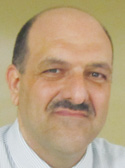Valley grad details struggles of life in Palestine


Bahour
By Ed Runyan
LIBERTY
Sam Bahour, a 1982 Liberty High School graduate, lives a long way from home, in Ramallah/al-Bireh in the West Bank, where he has worked 20 years as a entrepreneur and business consultant.
Bahour, an Arab American, went to the Middle East in 1993, just after the Oslo Accords, which created a Palestinian self-government and called for withdrawal of the Israel Defense Forces from parts of the Gaza Strip and West Bank in the Palestinian territories.
But Bahour, who spoke Thursday night at the Arab American Community Center on Belgrade Avenue in Liberty, says many people understand the accords and their practical effect on the Palestinian territories only from a distance.
Though the agreement seemed to provide Palestinians with self-determination, a closer look at its details shows that the agreement was “lopsided, setting up the Palestinians for failure,” he said.
Bahour, who was keynote speaker at the Friends of SABEEL Conference in Chicago recently, said a section dealing with telecommunications is an example of how it limited the ability of Palestinians to develop their economy.
Bahour, who studied computer technology at Youngstown State University, was interested in telecommunications and discovered that the way the Israelis were implementing the agreement was to provide only a limited amount of radio frequencies for the Palestinian telecommunications industry to use.
The result was the “cost of the network was three times more than it should have been,” and when Bahour and his business associates tried to bring the equipment they needed into the West Bank, the Israelis held their equipment at the port.
“Our equipment sat for two years” and wracked up storage fees, while similar equipment for Israeli companies got through in approximately two weeks.
The Israelis also held control over Palestinian business interests through custom fees. In that way, they had control over the budget of the entire Palestinian government, Bahour said.
In the years following, the Israelis established many types of “security” hoops for Palestinians to navigate, he said.
He described the myriad methods implemented over about the last decade to make travel and citizenship for people like him exceedingly difficult, nearly forcing him to leave the West Bank.
At one point, he had to have an Israeli stamp on his passport and two other types of permit to have permission to ask for a one-day permit to travel into Tel Aviv, Israel, and back to the West Bank by 7 p.m. from business trips.
Those and many other “hoops” meant that Palestinian business people spend 20 percent of their time figuring out how to navigate the rules of the Israeli occupiers, he said.
An example of how the restrictions have prevented the Palestinian economy from thriving is that today smartphones in the Palestinian territories are “dumb phones,” he said, meaning they don’t have the capacity to receive the Internet.
 43
43
